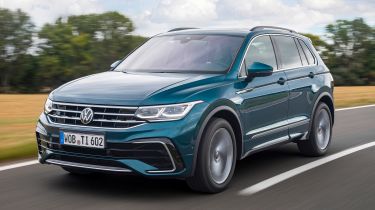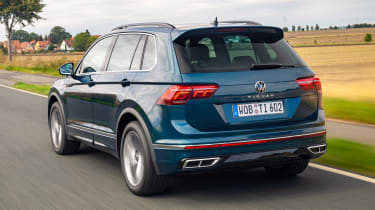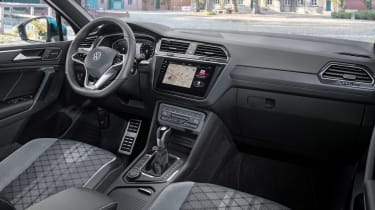New Volkswagen Tiguan 2020 review
The Volkswagen Tiguan has been updated for 2020, but is it better than ever?

Verdict
Volkswagen certainly hasn’t held back with this important mid-life facelift for the big-selling Tiguan. It drives exactly like it did before – so it’s unremarkable but comfortable – and offers a useful blend of performance and fuel economy in the case of this 148bhp diesel option. The selection of updates do enough to make it feel fresh alongside newer competition, but the final price could be the determining factor when the Tiguan goes on sale in the UK later this month.
Volkswagen has made quite a splash with the Tiguan since the first-generation model arrived in 2007. Over the past decade it’s steadily increased sales, with nearly one million units produced last year. It’s now VW’s best-selling car around the world, and therefore one of the most popular new cars on sale today.
Perhaps that’s why VW has pulled out all the stops for this facelifted second-generation model. It receives a significant redesign and plenty of new technology inside and under the skin. But while the engine line-up is familiar, two brand-new models are waiting in the wings for 2021: the new plug-in eHybrid and a full-fat performance Tiguan R with 316bhp.
In the UK there’s a new trim structure, which follows the new convention set out by the latest Golf. There’s the basic Tiguan, with the next rung up the ladder being the Tiguan Life. Two range-topping versions are offered: the comfort-focused Elegance and sportier R-Line, driven here in 2.0 TDI guise with 4MOTION all-wheel drive.
Used - available now

2019 Volkswagen
Tiguan
52,308 milesAutomaticDiesel2.0L
Cash £20,063
2024 Volkswagen
Tiguan
28,676 milesAutomaticPetrol1.4L
Cash £21,363
2019 Volkswagen
Tiguan
38,961 milesAutomaticDiesel2.0L
Cash £16,563
2024 Volkswagen
Tiguan
50,949 milesAutomaticDiesel2.0L
Cash £21,138On the outside, the Tiguan’s new face brings it into line with the larger Touareg. The nose is taller, the grille larger, and it feeds into redesigned LED headlights with a new adaptive matrix technology called IQ.Light, which is standard on R-Line cars.
Similarly, the rear end receives a nip and tuck, with a new rear panel and updated tail-lights, while the colour and selection of alloy wheels (ranging from 17 to 20 inches) have also been updated.
Inside you’re greeted by a new steering wheel with touch-sensitive buttons featuring haptic feedback, while there’s now digital instrumentation, thanks to a new 10-inch Digital Cockpit Pro set-up.
The central infotainment screen has been updated to VW’s latest standard, and features a fresh strip of touch-sensitive buttons, new menus and display technology, updated voice controls and screen sizes of up to 9.2 inches. Beneath it, the heating controls have also been updated with more modern (but perhaps not quite as functional) touch-sensitive switches.
On the surface these updates certainly make the popular Tiguan feel fresh, especially in the face of newer competition. Interior quality is as you were – so is good enough for a car at this price point. Soft-touch plastics are used in abundance, alongside plush leather trim for the steering wheel and gear selector. It feels robust and premium, but even on the R-Line you’ll have to fork out extra if you want leather seats.
There’s decent space, however, and with a boot sizing up at 615 litres with all seats in place, the Tiguan is still a practical choice. Since the bodyshell hasn’t changed, space in the rear also remains as it was; there’s enough room for three adults, and the rear bench can slide back and forth if you need to create more kneeroom or boot capacity.
While the Tiguan looks and feels new to the touch, the drive is very much a case of if it ain’t broke, don’t fix it. The Tiguan has always been a family SUV that few will venture off road in, and (hybrid and Tiguan R aside) VW’s drivetrain and chassis engineers haven’t been tasked with too much during the development of this facelifted model.
Petrol cars get cylinder deactivation that shuts off two cylinders to save fuel, while TDI diesels benefit from a new twin-dosing catalytic converter system, further reducing nitrous oxide emissions. The 148bhp 2.0 TDI tested here serves up competent performance without ever feeling fast. VW says 0-62mph takes 9.3 seconds, and the seven-speed DSG gearbox is slick enough when firing through its ratios at speed. It’s a little slack on kickdown, while refinement is good if not outstanding, but you’ll see 40mpg pretty effortlessly over a mixture of driving conditions.
If you don’t need four-wheel drive, then this 2.0-litre diesel is also available with front-wheel drive. Choose this and you’ll get better acceleration and overall performance thanks to the car’s lower weight, and better fuel economy to boot.
Where the Tiguan excels is with its resolved ride quality. It behaves exactly as you’d expect of an SUV of this size using the VW Group’s MQB platform. Adaptive dampers are optional if you so desire, but even on our car’s 20-inch wheels (standard on UK-bound R-Line models) the Tiguan wasn’t ever caught out on an admittedly smooth German test route. Similarly, the steering is familiar and predictable, with little feel coming back through the wheel, but an accuracy that makes the Tiguan easy and effortless to drive above all else.
On the motorway it’s a comfortable cruiser, and a new optional feature for this facelifted car brings VW’s Travel Assist semi-autonomous capability. This combines steering assistance and adaptive cruise control to enable partially automated driving in a single lane on motorway-style roads, where it keeps the car in lane, accelerating and braking where necessary. No UK prices for the new Tiguan have yet been revealed, but this is likely to be a pricey extra.
In fact, looking at the German price list for the Tiguan, it will still be one of the more expensive options in a class now bursting with strong entrants. Pick an R-Line 150 TDI with four-wheel drive, and the price translates to around £41,000.
Exactly what UK customers will get as standard and how much they’ll have to pay could be a sticking point. But although the Tiguan is a firm favourite, VW UK will have to work hard on competitive PCP deals to tempt buyers away from rivals, especially closely related models from SEAT and Skoda.
| Model: | VW Tiguan 2.0 TDI 150 DSG 4MOTION R-Line |
| Price: | £41,000 (est) |
| Engine: | 2.0-litre 4cyl turbodiesel |
| Power/torque: | 148bhp/350Nm |
| Transmission: | Seven-speed automatic, four-wheel drive |
| 0-62mph: | 9.3 seconds |
| Top speed: | 123mph |
| Economy: | 46.1mpg |
| CO2: | 169g/km |
| On sale: | Now |










